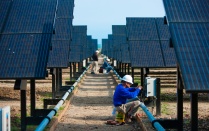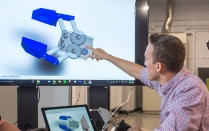Internships and Co-ops



On this page:
Internships and co-ops are an excellent way to gain hands-on experience in the engineering industry. In both cases, students may be eligible to earn academic credit.
Internships
Field experience working on an electrical engineering project in a real-world setting under the joint direction of a supervisor from industry and a faculty advisor from the Department of Electrical Engineering. Projects selected should integrate material learned in academic courses. Internships typically occur over the summer but can occur throughout the year. Students interested in earning academic credit for their internship should communicate with the department before the work experience begins.
Co-ops
Full-time work experience related to an engineering degree program in which a student temporarily leaves school (at least one semester). These experiences typically last 6-9 months and delay graduation.
Learn more about co-ops.
Our Students' Experiences
Undergraduates and graduate students alike benefit from learning through internships. Opportunities may be in small start-up companies or well established multi-national corporations.
Common Employers
How to Land an Internship
UB Career Services helps students learn how to build their career skills, prepare for job searches and interviews, organizes internship and job fairs and provides a database that connects UB students with future employers.

100+ employers connecting with 2,000+ UB students interested in the Science, Technology Engineering, Arts and Math fields.

100+ employers, 1,000+ students, four hours, and countless success stories, held annually in early March.
Requirements & Instructions
For Undergraduates:
Undergraduates should work with EE Academic Coordinator, Mary Busch, and EE Director of Undergraduate Studies, Kevin Burke, through the process of obtaining, registering for, and completing an internship or co-op.
International students should meet with an advisor from ISS (International Student Services) Office to ensure compliance with student visa and work authorization regulations.
For Graduate Students:
Graduate Students should work with EE Academic Coordinator Kathie Bartelo through the process of obtaining, registering for, and completing an internship or co-op.
International students should meet with an advisor from ISS (International Student Services) Office to ensure compliance with student visa and work authorization regulations.
For International Students:
In addition to meeting with your academic program coordinator, international students must meet with an ISS advisor.









